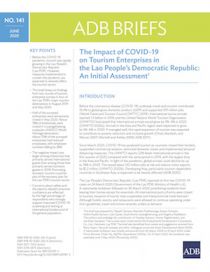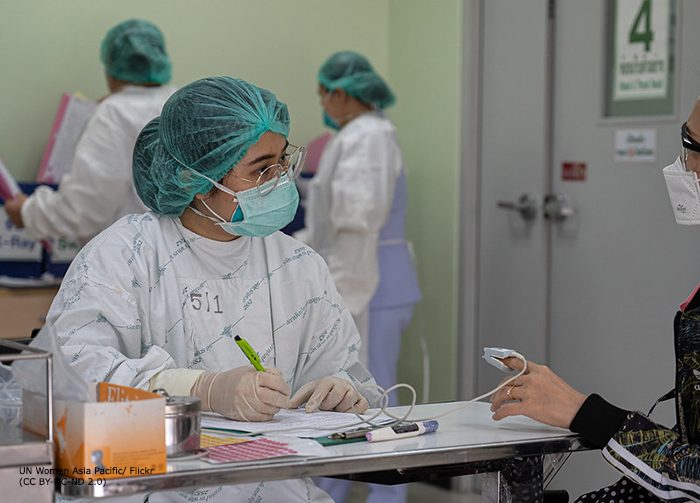
An Updated Assessment of the Economic Impact of COVID-19
This brief presents new projections on the economic impact of COVID-19 and highlights policy implications.
Countries in the Greater Mekong Subregion aim for Sustainable Development Goals for health. Through the Working Group on Health Cooperation, GMS countries are taking comprehensive, coordinated and proactive approaches to address regional health issues.
The Greater Mekong Subregion still experiences high incidence of communicable diseases and drug-resistant microorganisms. GMS countries also suffer from inefficient health systems due to lack of synergies, economies of scale, and scope; and there are few common solutions to common health problems.
The health agenda of the GMS Economic Cooperation Program Strategic Framework 2030 (GMS-2030) will focus on communicable disease control through cross-border surveillance and modeling, information exchange, implementation of international health regulations, and pandemic preparedness. Since universal health coverage is a critical regional public good, GMS-2030 will aim to accelerate its implementation. This will be effected by strengthening the performance of GMS health systems to prevent, detect, and respond to public health threats such as COVID-19 and other emerging diseases; supporting countries to comply with the World Health Organization’s International Health Regulations; applying a unified approach to environmental, animal, and human health (“One Health”); strengthening protection of vulnerable communities and migrants; building capacity and cross-border cooperation to address priority health issues; and advancing gender equality to build subregional health cooperation leadership and decision-making policy. GMS-2030 aims to provide a new setting for the development of this subregion for the next decade.
Regional health cooperation initiatives in the GMS, based on the 5-year strategy that identifies operational priorities for health cooperation for 2019-2023, focus on three strategic pillars:
Strategic Pillar 1: Health security as a regional public good tackles the subregion’s vulnerability to acute public health events. Ensuring robust national health systems with capacity to prevent, detect and respond to transnational health threats is the cornerstone of health security.
Strategic Pillar 2: Health impacts of connectivity and mobility respond to health challenges stemming from an increasingly interconnected GMS. Strengthening health systems in border areas where migrant and mobile populations pass and reside is an entry point for programming. Also includes. integrating health impact assessment during project planning and implementation of GMS urban and transport infrastructure projects.
Strategic Pillar 3: Health workforce development builds on the subregion’s existing human resource capacity to address common health challenges. Strong leadership in turn opens opportunities for intraregional capacity building, utilizing the subregions’ depth of health human resource and health programming experience to tackle shared health issues and enhance country efforts to attain Sustainable Development Goal targets.
The Working Group on Health Cooperation seeks to address collective action problems of regional health investments and limited resources for health that tend to prioritize national investments.
Related
Focal Persons at the Asian Development Bank
Rikard Elfving
Human and Social Development Sector Office
Sectors Group
Najibullah Habib
Human and Social Development Sector Office
Sectors Group
Other Concerned Staff & Consultants
Pinsuda Alexander
Regional Cooperation and Integration Unit
Southeast Asia Department
Mario Randolph Dacanay
Human and Social Development Sector Office
Sectors Group
Rowena Sancio
Regional Cooperation and Integration Unit
Southeast Asia Department/GMS Secretariat
Send inquiries to GMS Secretariat.
Focal Persons at the Asian Development Bank
Rikard Elfving
Human and Social Development Sector Office
Sectors Group
Other Concerned Staff & Consultants
Pinsuda Alexander
Regional Cooperation and Integration Unit
Southeast Asia Department
Mario Randolph Dacanay
Human and Social Development Sector Office
Sectors Group
Rowena Sancio
Regional Cooperation and Integration Unit
Southeast Asia Department/GMS Secretariat
Send inquiries to GMS Secretariat.
After more than 20 years, the Working Group on Human Resource Development was restructured in 2017 to focus on health, given the strategic importance of regional cooperation in this area.
Labor migrants in the Greater Mekong Subregion play a vital role in economic development. The Asian Development Bank (ADB) and the International Organization for Migration (IOM) have organized joint virtual dialogues on labor mobility.
Consequent to the review of the GMS Institutional Framework in 2016 and a separate review of the Strategic Framework and Action Plan for Human Resource Development in the GMS 2013–2017, GMS ministers endorsed the creation of the Working Group on Health Cooperation in 2017.
Human resource development, however, continues to be an important sector in the Greater Mekong Subregion. At an extraordinary meeting of the Working Group on Human Resource Development in Bangkok on 4 July 2017, participants agreed on the following key points:
Related

This brief presents new projections on the economic impact of COVID-19 and highlights policy implications.

This brief outlines the implications of the coronavirus disease (COVID-19) pandemic for food security in Asia and the Pacific and suggests policy responses.

This brief estimates the initial impact of coronavirus disease (COVID-19) on tourism enterprises in the Lao People’s Democratic Republic (Lao PDR).
In the popular imagination, the coronavirus disease (COVID-19) pandemic has been a boon for the natural world. With more than a third of the global population under some level of lockdown, we’ve delighted to see skies burst back into blueness and wild animals venturing into urban neighborhoods. It’s been easy to convince ourselves that wildlife and the environment have flourished. The truth, however, isn’t so reassuring. The pandemic has created an increase in poaching, animal trafficking, illegal fishing and other environmental crimes.
Conducted by Ministry of Health, Lao PDR, June–December 2018

Cambodian migrants arriving by train at Anranya Prathet, Thailand. Photo by Joe Lowry via IOM - UN Migration (CC BY-NC-ND 2.0) © IOM 2014
When it comes to the coronavirus disease (COVID-19) outbreak no one is safe until everyone is safe. This was one of the key points emphasized by Dr.

Medtecs Group, a supplier of personal protective equipment in Cambodia, employs 5,500 people at its Kampong Cham factory. It has provided stable jobs, contributing to the local economy, which is critical as Cambodia braces for the impact of COVID-19. Photo by Medtecs Group via ADB
In immediate response to global efforts to combat the pandemic, the Health Sector Group of the Asian Development Bank (ADB)’s Sustainable Development and Climate Change (SDCC) Department mobilized funding for Technical Assistance (TA) on Regional Support to Address the Outbreak of Coronavirus Disease 2019 (COVID-19) in the amount of $48.3 million in early 2020.

Sample infographic materials distributed by the Ministry of Health, Viet Nam from the country's COVID-19-dedicated website.
Viet Nam's Prime Minister Nguyen Xuan Phuc delivered a report on how the coronavirus disease (COVID-19) was contained and managed in the country, and solutions to restart the economy, at the opening ceremony of the country’s 14th National Assembly’s 9th working session on 20 May 2020.

A frontline healthworker at the Thailand Bamrasnaradura Infectious Disease Institute, Ministry of Public Health. Photo by UN Women Asia and the Pacific.
Cambodia, the Lao People’s Democratic Republic (PDR), Myanmar and Viet Nam, CLMV countries in the Greater Mekong Subregion (GMS), have experienced a relatively smaller number of reported cases and fatalities of the coronavirus disease (COVID-19). As of 22 June, Cambodia reported 129 confirmed cases, Lao PDR reported 19 confirmed cases, and Viet Nam reported 349 confirmed cases. All three countries recorded 0 deaths from COVID-19. In Myanmar, while there have been 6 deaths, only 286 confirmed cases were reported.

A 24/7 automatic dispensing machine provides free rice for people out of work following the lockdown. This was spearheaded by a Vietnamese entrepreneur in Ho Chi Minh City. Photo by Reuters on Twitter.
An initiative by the Mekong Tourism Coordinating Office (MTCO), Destination Mekong, and the Mekong Institute (MI) taps individuals' help in crowdsourcing newly-spotted innovations on how the coronavirus disease (COVID-19) is being managed and/or overcome in the Greater Mekong Subregion (GMS).